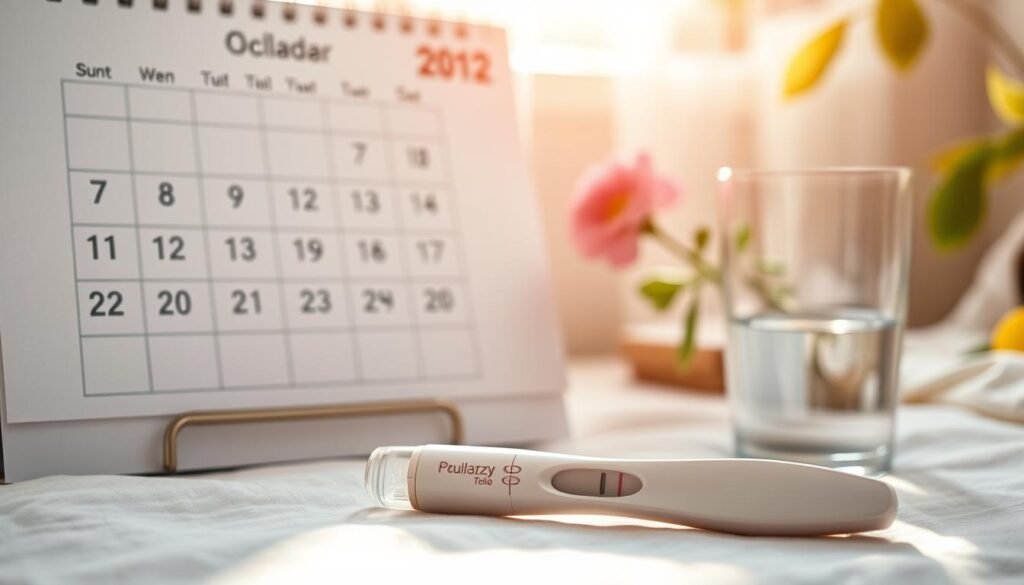Did you know about 70% of women feel very tired after ovulation? This might be an early sign of pregnancy for many. Often, this extreme tiredness is not noticed much. It’s because other symptoms like missing periods or feeling sick in the morning are more obvious. But knowing about this tiredness is crucial. It points to a big change in the body during the luteal phase.
After ovulation, the body starts to change because of hormones, especially progesterone. This hormone can make you feel really tired. For some, this tiredness is so severe it gets in the way of everyday life. If you’re feeling unusually worn out after ovulation, it might mean something important. It’s best to talk to a doctor for advice and to figure out what’s happening. They can help diagnose any strange or ongoing tiredness.
Key Takeaways
- Extreme fatigue after ovulation is a common experience for many women.
- This fatigue can be an early indicator of pregnancy.
- Hormonal changes, particularly an increase in progesterone, significantly impact energy levels.
- Consulting healthcare professionals can provide clarity on personal symptoms and fatigue.
- Managing lifestyle factors like diet, sleep, and stress can help alleviate ovulation fatigue.
Understanding Ovulation and the Luteal Phase
Ovulation is a key event in the menstrual cycle. It’s when an egg is released from the ovary. This starts the luteal phase, lasting about 14 days. In this time, the body gets ready for a possible pregnancy through changes in hormones, mainly progesterone.
After ovulation, you might notice several changes. These are known as ovulation symptoms and can impact your day. This phase brings:
- Mood fluctuations: Many experience emotional ups and downs during this time.
- Physical changes: Symptoms like tender breasts, bloating, acne, and altered appetite can appear.
- Vaginal discharge variations: The discharge usually becomes thicker, shifting from a wet, slippery consistency.
A normal luteal phase lasts from 10 to 17 days. If it’s shorter than 10 days, conception might be harder. Luteal phases over 18 days may point to conditions like polycystic ovary syndrome (PCOS).
Knowing about these phases is crucial. Even though eggs can be fertilized 12 to 24 hours after ovulation, implantation usually occurs 6 to 12 days later. For those trying to conceive, it’s important to understand how hormonal shifts can cause symptoms. This underscores the need to monitor the luteal phase for reproductive health.
What Are the Common Ovulation Symptoms?
It’s useful to know the Common Ovulation Symptoms if you’re trying to get pregnant. These symptoms help figure out when ovulation happens in the menstrual cycle. Look out for signs like:
- Bloating – Many experience a sensation of fullness or swelling in the abdomen around ovulation.
- Breast tenderness – Due to hormonal fluctuations, breasts may feel more sensitive or heavy.
- Mood swings – Emotional changes can occur, making some feel irritable or overly emotional.
- Increased libido – A natural surge in sex drive may signify approaching ovulation.
- Mittelschmerz – About 40% of women may experience a dull ache on one side of the lower abdomen, symbolizing ovulation.
- Cervical mucus changes – The cervical mucus typically becomes clear, slippery, and elastic, resembling raw egg whites, indicating peak fertility.
These symptoms can be different for everyone. It’s important to watch for these signs. Knowing them helps with planning for a family. It also helps tell the difference between luteal phase symptoms and early pregnancy signs.
As ovulation gets closer, basal body temperature can go up by about 0.5-1°F. Keeping track of this temperature and other symptoms gives a better idea of ovulation. Some might feel tired during this time, but it’s usually short-lived. Staying hydrated and eating well can help manage this tiredness well.
Extreme Fatigue After Ovulation, Pregnant
Feeling very tired after ovulation is normal, especially if you’re pregnant. This tiredness is due to changes in hormones. Your body gets ready for the hard work of early pregnancy. Women often feel more tired after ovulation during the luteal phase.
The luteal phase comes right after ovulation and goes until the next period starts. This time can make you feel really drained. High levels of a hormone called progesterone make you feel more tired. You might notice this tiredness along with other early signs of pregnancy. These can include tender breasts, feeling sick, and needing to pee more. These signs can show up as soon as four days after ovulation.
If you think you might be pregnant, watching for these signs is important. Feeling very tired early on isn’t just in your head. It means your body is using more energy for the baby growing inside you. Eating right and resting can help you feel better. For tips on early pregnancy signs, visit common early pregnancy signs.
Keeping an eye on how your body reacts can help you understand your tiredness. Knowing what’s normal for you helps you decide when to get help if the tiredness doesn’t go away. Some natural treatments might help with tiredness related to your adrenal glands. Learn more about these treatments at natural remedies for adrenal fatigue.
Knowing how hormone changes affect your tiredness helps you manage your health better. It’s key to pay attention to what your body is telling you. This could be the first sign of an exciting, though tiring, journey of pregnancy.
The Role of Progesterone in Early Pregnancy
Progesterone is very important early in pregnancy. It affects the body a lot. After ovulation, its levels go up. This is known as a Progesterone Surge. This surge makes the uterine lining ready for a fertilized egg to implant. This supports a possible pregnancy.
When progesterone levels rise, women may notice early pregnancy signs. One common symptom is feeling very tired. This tiredness often comes from higher progesterone levels. This hormone also affects emotions. It can lead to mood swings and sensitivity to different things.
Progesterone also slows down the digestive system. This slowing can cause constipation, a frequent early pregnancy symptom. It can also cause bloating, more bathroom trips, and sore breasts. These are known as Pregnancy Hormones at work.
High levels of progesterone help stop early contractions. This prevents early labor. This balance is very important in the first trimester. The body is making big changes then. Progesterone levels get even higher as the pregnancy goes on. By the third trimester, it reaches its peak. It gives support to both mom and the growing baby.
Knowing about progesterone helps us understand early pregnancy. It explains why some women feel very tired or have other symptoms. This knowledge helps women handle these changes better. It helps in dealing with hormone level changes.
Identifying Luteal Phase Fatigue
Luteal Phase Fatigue is a unique kind of tiredness that hits some women after ovulation. It happens between days 15 and 28 of a 28-day menstrual cycle. Knowing about this fatigue helps women keep better track of their cycles.
This fatigue is linked to hormonal changes in the body. After ovulation, estrogen drops and progesterone rises. These shifts can lead to feeling super tired and having mood swings. Recognizing these signs is crucial for understanding your body better.
To identify Luteal Phase Fatigue, watch for a few signs:
- Timing: Notice when the tiredness starts in your cycle.
- Accompanying Symptoms: Look out for mood changes, bloating, and food cravings.
- Sleep Quality: Bad sleep can make this tiredness worse.
- Stress Levels: Too much stress can increase your fatigue.
Keeping a journal about post-ovulation tiredness could be handy. Note down your energy levels, symptoms, and what you do daily. This can show patterns and how the luteal phase affects you.
| Factor | Impact on Fatigue |
|---|---|
| Hormonal Changes | Progesterone peaks, leading to increased tiredness. |
| PMS Symptoms | Physical and emotional symptoms contribute to overall fatigue. |
| Sleep Quality | Poor sleep exacerbates feelings of tiredness. |
| Dietary Choices | Unhealthy cravings can lead to blood sugar fluctuations, worsening fatigue. |
| Hydration | Dehydration increases sluggishness and feelings of fatigue. |
It’s important to pay attention to Luteal Phase Fatigue. By understanding it and its connection to the menstrual cycle, women can better manage their energy. This knowledge is key to feeling better.
Symptoms of Early Pregnancy Exhaustion
Early Pregnancy Exhaustion leads to symptoms showing big body changes. A main sign is tiredness, mostly because of high progesterone levels. This tiredness often gets better in the second trimester but might come back late in pregnancy.
Another frequent symptom is nausea, or morning sickness. It affects almost half of all pregnant women. In extreme cases, it can cause severe nausea and loss of water. Soreness and swelling of the breasts are also common but usually improve as the body adapts.

Spotting, or slight bleeding, may occur about ten days after conception. It’s often confused with a normal period. Cravings, a strong sense of smell, and always feeling hungry are common. A metallic taste in the mouth is also noted by many.
Other Symptoms of Pregnancy may include:
- Headaches and dizziness
- Cramping, especially if severe or on one side
- Mood swings because of hormone changes
- Frequent urination due to more blood flow
- Bloating and constipation from body and hormone changes
- Acne or skin changes from more oil production
Knowing these symptoms helps deal with early pregnancy’s challenges. When needed, check with doctors for advice. For more on chronic tiredness, see ICD-10 codes for fatigue. Tracking symptoms early ensures proper care for a safe and healthy pregnancy journey.
How Long Does Fatigue Last After Ovulation?
Fatigue after ovulation varies greatly from person to person. For some women, Pregnancy Fatigue starts right after conception. This is because hormone levels change, notably when progesterone increases during early pregnancy.
The Duration of Fatigue After Ovulation can last a few days to weeks. Tiredness might begin after implantation, which can happen six days after ovulation. Fatigue gets worse as the body makes more hCG hormone.
About 33% of pregnant women feel very tired early on. This can continue through the first trimester or even longer. Mood swings and cravings after ovulation can make you feel more tired.
It helps to know what might happen. Here’s a table with common timelines and experiences with post-ovulation fatigue:
| Time (Days Post-Ovulation) | Possible Experience |
|---|---|
| 1-6 DPO | Fatigue may start as the body adjusts post-ovulation. |
| 6-10 DPO | Implantation occurs, leading to increased symptoms. |
| 10-14 DPO | Hormonal changes intensify; fatigue can peak. |
| 2 weeks after ovulation | Pregnancy tests may show positive results; fatigue may persist. |
Implantation Fatigue: What to Expect
Implantation fatigue is a special kind of tiredness. It happens when a fertilized egg sticks to the uterine wall. This usually occurs about 6 to 12 days after ovulation. It’s an important time for women trying to get pregnant, marking the early stages of pregnancy. Knowing the Signs of Implantation helps in understanding this phase.
During this vital time, women might feel different symptoms. These include:
- Fatigue: An intense tiredness may appear, making you want to rest more.
- Cramping: The body might go through mild cramping as it adjusts.
- Light Spotting: Sometimes known as implantation bleeding, it looks like very light spotting. It’s often confused with a light period.
The signs of implantation might be mistaken for signs of getting your period. These can include bloating and mood changes. Knowing the difference is good for tracking reproductive health. While stress or lifestyle choices can cause tiredness, recognizing implantation fatigue is crucial.

It’s crucial to remember that this tired feeling might continue into early pregnancy. It’s not just during implantation. Hormonal changes in the body lead to this tiredness. They can affect how you go about your day and your energy levels. Paying close attention to your body helps uncover the early signs of pregnancy.
The Connection Between Hormonal Changes and Fatigue
Hormonal changes and fatigue are closely linked during the luteal phase and early pregnancy. Hormones like progesterone and hCG affect our energy and well-being. Knowing about these changes helps us understand why we feel more tired during these times.
Ovulation happens in the middle of the menstrual cycle. It causes spikes in hormones like estrogen, getting the body ready for pregnancy. After ovulation, a rise in progesterone can make you feel sleepy and lower your energy, similar to early pregnancy.
Estrogen levels drop after ovulation, leading to tiredness and mood changes. Implantation, occurring about 6 to 12 days after ovulation, brings more fatigue and mood swings. These symptoms are mainly due to hormonal shifts.
Extra fatigue after ovulation can be worsened by lifestyle factors. Stress, poor eating habits, little exercise, and bad sleep can drain our energy. To manage these symptoms, try:
- Prioritizing adequate sleep
- Staying hydrated
- Maintaining a balanced diet
- Engaging in regular exercise
- Implementing stress management techniques
Sometimes, ongoing or severe tiredness might signal a health issue, like thyroid problems or anemia. It’s important to see a doctor in these cases. Recognizing how hormonal changes affect fatigue is crucial, especially when progesterone increases in the first trimester.
Learning about these hormone shifts helps us understand our bodies better. It also prepares us for the changes during important life phases.
| Hormonal Change | Impact on Fatigue |
|---|---|
| Progesterone Increase | Induces drowsiness and lower energy levels |
| Estrogen Decrease | Can lead to feelings of low energy and mood swings |
| hCG Levels Rise | May contribute to early pregnancy fatigue |
| Blood Volume Increase | Can lead to fatigue due to increased heart rate and breathing |
When to Take a Pregnancy Test After Ovulation
Finding the right Timing for Pregnancy Test is key for correct results. Many women ponder when to test after ovulation. It’s best to wait about 12 to 15 days after ovulation. This is when hormone levels normally change.
After ovulation, an egg stays viable for 12 to 24 hours for fertilization. Should fertilization occur, implantation could start 5 to 6 days later. But, it might take until 11 days after ovulation. Most successful implantations happen from 8 to 10 DPO. This is when the body’s hCG levels start to increase.
Experts say to do a pregnancy test in the morning of your next period’s due day. This is usually around 14 DPO for people with a 28-day cycle. Home pregnancy tests are about 99 percent accurate if used right. But errors can lead to false negatives if done too soon.
A table outlining the recommended testing timeline might look like this:
| Days Post Ovulation (DPO) | Recommended Action | hCG Levels |
|---|---|---|
| 6 – 8 DPO | Possible early testing, results may be unreliable | hCG may begin to rise |
| 10 – 12 DPO | Testing may yield reliable results | hCG levels increase |
| 14 DPO | Optimal time to take a pregnancy test | Reliable results expected |
It’s smart for women to monitor their symptoms and know their cycles. By setting realistic expectations and avoiding too-early tests, they can care for their emotional health during this important time.

How to Cope with Pregnancy Fatigue in the First Trimester
During the first trimester, many experience intense fatigue, almost needing twice as much sleep. This tiredness mainly comes from hormonal changes, like the big increase in progesterone. Luckily, there are many ways to ease this First Trimester Fatigue.
Eating right is key to managing fatigue. Eating small, balanced meals throughout the day fights both tiredness and nausea. It’s also critical to drink plenty of fluids to stay hydrated. These habits greatly improve well-being during this challenging time.
Being active helps too. Light exercises, like walking or stretching, make the body and mind feel refreshed. Finding chances to move during the day, taking breaks to stretch or breathe deeply, can significantly lessen exhaustion.
- Take naps during the day to make up for lost sleep at night.
- Going to bed earlier helps ensure you get enough rest.
- Stay away from caffeine to sleep better.
- Focus on self-care and cut back on extra activities to lessen stress.
- Remember to be patient with yourself, understanding fatigue is normal now.
Keeping an eye on how tired you feel is important. Constant, severe tiredness that doesn’t get better with rest may mean there’s a health problem that needs a doctor’s care. Though many see their energy return in the second trimester, fatigue might come back in the third trimester because of more weight and sleep issues.
Stressing the need for enough sleep, proper nutrition, and light exercise can help manage Pregnancy Fatigue better. With these tips, a healthier and more balanced first trimester is possible.
Conclusion
Knowing about pregnancy fatigue is crucial for women, especially when they think about their menstrual cycle and early pregnancy signs. When extreme fatigue happens after ovulation, it can be due to hormonal changes. One main hormone is progesterone, which makes you feel tired and emotional.
It’s important for women to recognize symptoms like breast tenderness, mood swings, and changes in cervical mucus. These signs make the luteal phase a complex time. Being aware of fatigue symptoms reminds women to take care of themselves. This means getting enough rest, staying hydrated, and living a balanced life.
If the fatigue gets worse or worries you, talking to a doctor is a good idea. Knowledge about pregnancy fatigue helps in handling the symptoms. It also supports emotional health during this important phase. Being informed and having support makes a big difference in women’s reproductive health journeys.